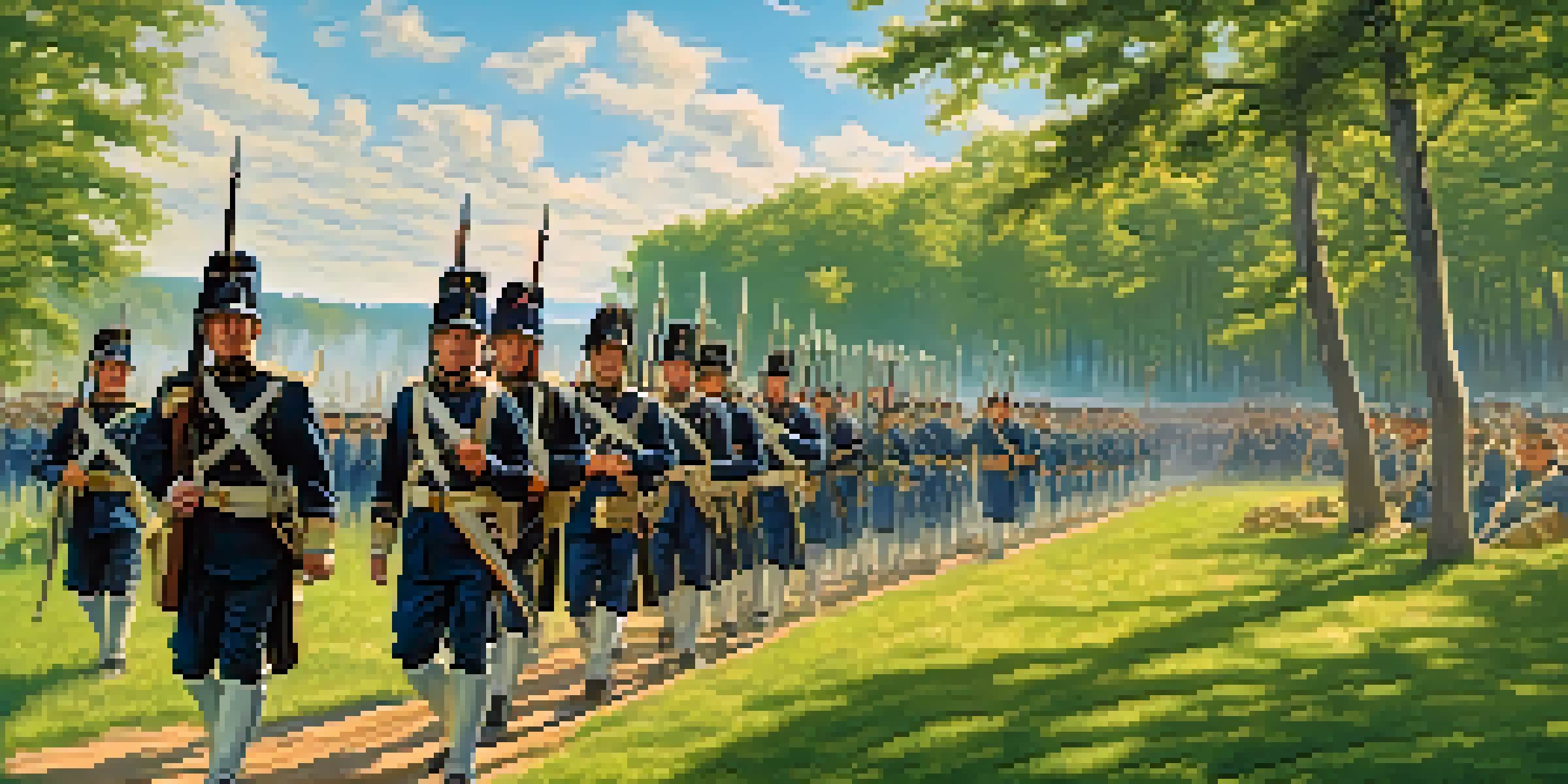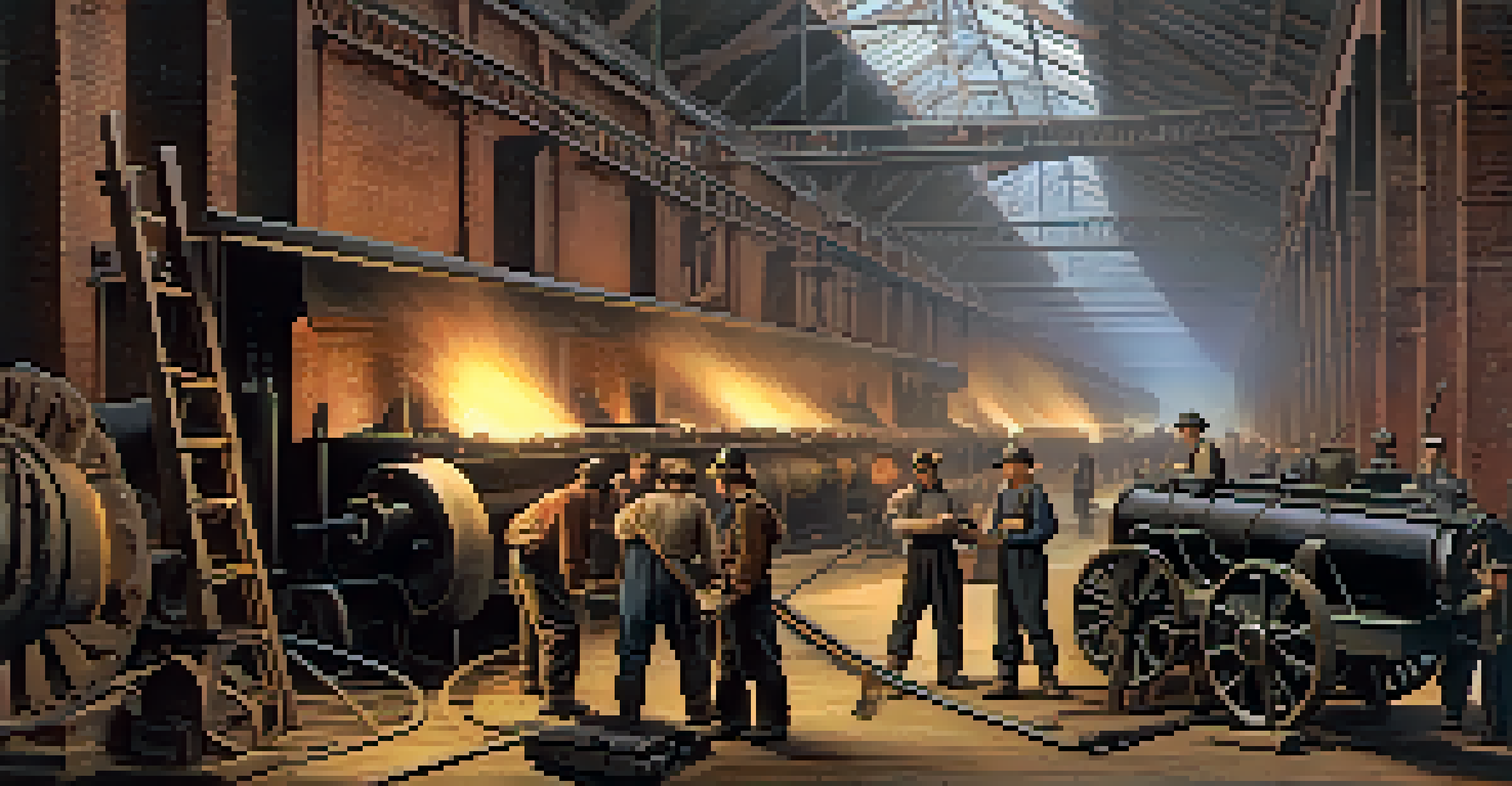Civil War Era: New Jersey's Contributions and Challenges

New Jersey's Strategic Importance in the Civil War
New Jersey held a crucial geographical position during the Civil War, situated between the Union capital of Washington, D.C. and the Confederate stronghold of Richmond, Virginia. This location made it a strategic hub for troop movements and supply routes, with railroads and waterways facilitating quick transportation. The state's accessibility allowed for rapid deployment of soldiers and resources, which played a significant role in the Union's military strategies.
In the midst of battle, we find our true selves and the courage to stand for what we believe in.
Moreover, New Jersey's proximity to major cities like Philadelphia and New York further enhanced its importance. Supplies and reinforcements could be efficiently funneled to the front lines, making the state an essential contributor to the Union's war efforts. The state's infrastructure not only supported military operations but also helped in the mobilization of volunteers eager to fight for the Union cause.
In essence, New Jersey's strategic location was not merely an advantage for logistics; it symbolized the state's commitment to the Union. The residents recognized their role in the broader conflict and rallied to support the war effort, showcasing a sense of duty and pride that resonated throughout the state.
The Volunteer Spirit: New Jersey Soldiers in Action
Many New Jersey residents answered the call to arms, with thousands enlisting in the Union Army. The state contributed over 88,000 troops, forming numerous regiments that would see action in major battles like Gettysburg and Antietam. This high enlistment rate reflected a strong volunteer spirit among citizens, driven by a desire to preserve the Union and end slavery.

One notable unit was the 15th New Jersey Volunteer Infantry, recognized for its bravery during key engagements. These soldiers not only fought valiantly but also brought their own unique experiences and backgrounds to the battlefield, enriching the tapestry of the Union Army. Their sacrifices highlight the personal stories behind the numbers and statistics of war.
New Jersey's Strategic Role in War
New Jersey's geographical position between key cities made it crucial for troop movements and logistics during the Civil War.
The enthusiasm of New Jersey's volunteers wasn’t limited to the battlefield; communities rallied around them, organizing fundraisers and support groups to aid the troops. This collective effort fostered a sense of unity and purpose, illustrating how New Jerseyans stood together during a tumultuous time in American history.
Women of New Jersey: Pioneers in Support Roles
While men were off fighting, women in New Jersey stepped up in remarkable ways, challenging traditional gender roles. They organized aid societies, knitted blankets, and sewed uniforms, all while managing households and farms. Their contributions were vital in providing much-needed supplies to the soldiers, demonstrating resourcefulness and resilience.
The contributions of women during wartime are often overlooked, yet their resilience and determination shape the very fabric of our society.
One prominent figure was Sarah E. Dorsey, who became known for her work in the Sanitary Commission, advocating for better medical care for soldiers. Women like Dorsey not only supported the war effort but also laid the groundwork for future movements advocating for women's rights. Their involvement showcased the expanding role of women in society, particularly in times of crisis.
As the war progressed, these women often found themselves at the forefront of social and political change. Their efforts during the Civil War would eventually contribute to the burgeoning women's suffrage movement, illustrating how their wartime experiences shaped their aspirations for equality and societal recognition.
New Jersey's Industrial Contributions to the War
New Jersey's industrial capacity played a vital role in the Union's war efforts. The state was home to numerous factories that produced everything from textiles to munitions, supplying the military with essential goods. This industrial base not only supported the army but also provided jobs for many residents, highlighting the interconnectedness of war and economic activity.
One of the most significant contributions came from the ironworks, which produced cannons and other artillery. The state was known for its high-quality iron products, making it a key player in the manufacturing sector during the war. This industrial strength helped the Union maintain its military edge, ensuring that troops were well-equipped for battle.
Volunteer Spirit Fueled Contributions
Thousands of New Jersey residents enlisted in the Union Army, showcasing a strong volunteer spirit and community support for the war effort.
Moreover, the economic boom brought on by war-related manufacturing provided a sense of stability for many families in New Jersey. While the conflict brought hardships, it also spurred growth and innovation in industries that would continue to shape the state's economy long after the war ended.
Civilian Life: Challenges in New Jersey During the War
Life in New Jersey during the Civil War was not without its challenges. With so many men away at war, families faced the burden of managing farms and businesses alone, often leading to financial strain. The absence of breadwinners created a ripple effect, impacting the local economy and community dynamics significantly.
Additionally, the war brought about social tensions, particularly regarding issues of conscription and anti-war sentiments. Some residents opposed the war, leading to protests and unrest in certain areas. This division reflected a broader national conflict and illustrated how the war affected social cohesion within the state.
Amid these difficulties, communities often came together to support one another. Local organizations formed to provide assistance to families of soldiers, demonstrating a collective resilience. These grassroots efforts showcased the strength of community bonds, even in the face of adversity.
The Aftermath: New Jersey's Post-War Recovery
Following the Civil War, New Jersey faced the daunting task of recovery and rebuilding. The return of soldiers brought both relief and challenges, as many veterans struggled to reintegrate into civilian life. Communities had to find ways to support these individuals, many of whom bore physical and emotional scars from their experiences.
Economically, the state began transitioning from wartime production to peacetime industry. The skills and innovations developed during the war laid the foundation for a thriving industrial sector in the years to come. This shift also offered new opportunities for women and minorities, who increasingly sought roles in the expanding workforce.
Women Pioneered Support Roles
Women in New Jersey took on vital roles during the Civil War, organizing aid efforts and challenging traditional gender norms.
Despite the challenges, New Jersey emerged from the war with a renewed sense of identity and purpose. The sacrifices made during the conflict served as a catalyst for social change, paving the way for future movements advocating for civil rights and equality within the state.
Legacy: New Jersey's Civil War Memory and Commemoration
The legacy of New Jersey's contributions during the Civil War is commemorated through various memorials and historical sites across the state. These monuments serve as reminders of the bravery and sacrifices made by those who fought and supported the war effort. They provide a space for reflection and education, ensuring that future generations understand the significance of this tumultuous period in American history.
Additionally, local history organizations and museums work tirelessly to preserve artifacts and stories from the Civil War era. Through reenactments, exhibitions, and educational programs, they engage the community in an ongoing dialogue about the war's impact on New Jersey and the nation as a whole. These efforts foster a deeper appreciation of the sacrifices made by both soldiers and civilians.

As New Jersey continues to evolve, the memory of the Civil War remains a vital part of its collective identity. The lessons learned during that time resonate today, reminding us of the importance of unity, resilience, and the ongoing struggle for justice and equality.